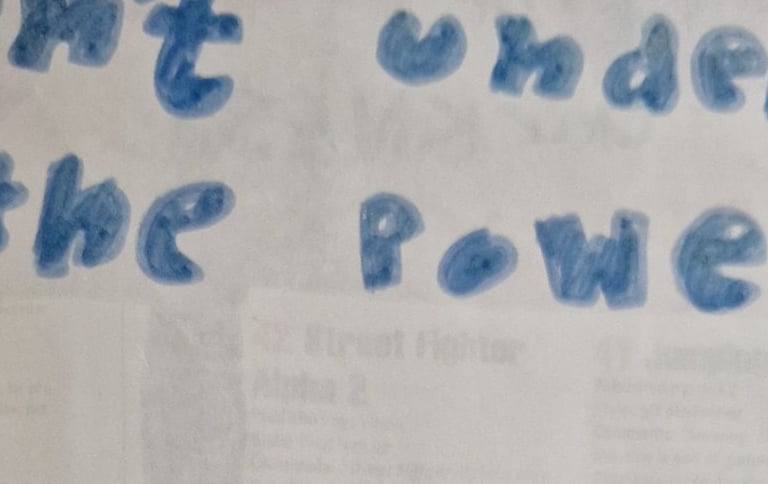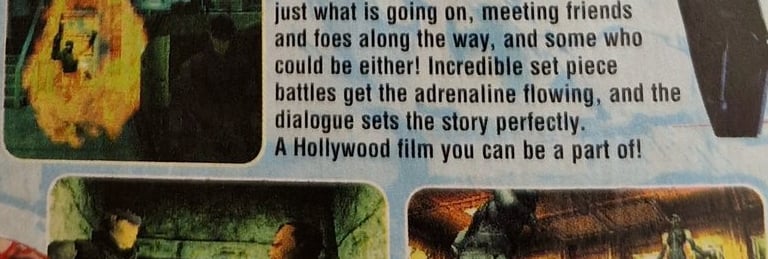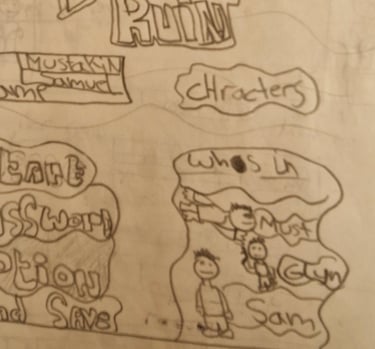
My love for video games and a little game called Metal Gear Solid
My inspirations
Mustakin Hashim
4/30/20248 min read


I have something to say. Let’s talk about Metal Gear Solid.
The year is 1998. I was seven-years-old. At that age, I wasn’t allowed to play on the PlayStation without asking my brother first, so naturally, I would watch every game he played, hoping he will pass me the controller even just for a minute of gameplay. Now, most of these games were simple platformers, games such as Crash Bandicoot and Rayman. There were also adult games such as the brilliant Tomb Raider and the frightening Resident Evil. Yes, I was too young, and a little scared to play some of those games, but my childhood mind soon realised that it is, after all, just a game. Just a game. Now that’s a disparaging sentence that would most definitely tick someone off. Just for the record, video games are equally artistic as films and books. Much of my inspiration comes from video games, and I am unashamedly proud of that. I grew up with them just as much as watching films, perhaps even more so. Video games can make you laugh, cry, feel happy and sad just like films and books can. The truth is, video games have an extraordinary ability to engage players completely in a virtual world, creating a level of empathy with characters that films are unlikely to replicate. You follow in their footsteps, quite literally controlling them in their world. Living their world.
You probably know by now that I live and breathe stories. I love the art of storytelling and telling stories. Video games of old told stories, albeit simple ones. And if you dug a little deeper, the simplest stories told greater ones. A kid couldn’t understand the intricacies of what goes behind creating these simple stories within video games. I couldn’t. Mario saving Princess Peach every time was a story. A simple one, but a story, nonetheless. Adding context to video games gave the game a hero to root for, just like any story. But none of these games had told a story quite like a film did. The technology wasn’t there. Not until the release of Sony’s PlayStation.
Unlike video games, which mostly presented themselves in a two-dimensional plane and, as technology improved, three dimensions, filmmakers constructed films very differently from video games. I don’t think anyone before the 90s thought video games would head in the direction that it has today. Video games today adopt a storytelling approach that closely mirrors films. Video games, like movies, include cinematic cuts that are made up of well-composed scenes. And in those scenes are characters. Characters that have an actor behind the voice, sometimes even in motion capture. Video games had become films. Nowadays, the majority of popular AAA games have a cinematic storytelling approach. There are twists and turns in a story filled with relatable and flawed characters. Some may argue that video games are trying to be too much like films, but the way I like to see it is this. Video games like the days of old are still out there. Take a glance at Steam and you'll find numerous underappreciated games.
The notion of video games becoming very much like films occurred to me when I was but seven-years-old. I remember reading in the official PlayStation magazine that the newly released game, Metal Gear Solid, was just like ‘watching a movie’. I wish I could go back in time and tell myself to keep that magazine so I could be 100% sure that was the actual quote, but it was somewhere along those lines. Luckily, I still have a small article from the magazine. The writer had described that Metal Gear Solid was, ‘a Hollywood film you can be a part of!’.
I didn’t know what to expect when my older brother put the Metal Gear Solid CD into the PlayStation. All I knew was that video games were going to change forever as soon as I heard the iconic melody (du du du du-du-du) when the Konami logo appeared on the screen. Even my seven-year-old self knew that. I didn’t know how it was going to change. I knew without a shadow of a doubt that this game was something special. The question of why I couldn’t utilise the enemies' firearms, something that would frustrate me as a kid – something I passed off as stupid because why on earth couldn’t I use the enemies’ guns? As a young boy, I couldn't grasp the concept that their rightful owners could only operate the guns in Metal Gear Solid. The firearms in Metal Gear Solid could only be operated by their rightful owners because they had nanomachines, microscopic machines, in their blood that connected them to the weapons and attached a unique signature. Not only could you not pick up the enemies’ weapons, you could not go in all guns-blazing. I mean, you could, but your chances of survival drastically decreased. Metal Gear Solid redefined what it meant to be an action game. This was a stealth game. The less noise you made, the better chance of survival you had. I like that. Action in general makes me tired, even reading long texts of action – I find it extremely exhausting. Heavy and well thought out cinematic style set-pieces is my go-to, something I hope you will find in my Aura Ignition series. My ambition extends beyond simply writing a book. My goal is for people to have an immersive experience with my book. Envision it as if you were watching a movie straight out of Hollywood. I seek to entertain.
Once we got past the initial frustration of my brother struggling with the menu screen due to the game controller being set to the Japanese format, we were ready to go. Some context: You see, X on the controller was always the select button. Not for this game. Circle, or O, whatever camp you sit in, I will not argue with you, was used to select options on the menu. It wasn’t until the release of Metal Gear Solid 4 on the PlayStation 3 that the game used the western controller format. Personally, I liked it just the way it was. There was a charm to it, something only Hideo Kojima could get away with.
Now, back to the game. I don’t think I blinked once during the opening scenes. The game included elements such as music, framed shots, cuts, voiceover, and both diegetic and non-diegetic sounds. I wasn’t watching a video game. I was watching a film. I lacked complete comprehension of the situation or a profound understanding of the story's rationale – all I knew was that there was a solitary soldier on an island tasked with rescuing individuals. That’s the simple story of it. Naturally, there is a much deeper and more complex story, brimming with intrigue and a decades-spanning backstory, interweaving an unusual blend of fantasy and science-fiction elements, a revelation that only fully dawned on me during my teenage years when I replayed the game. However, I must say, the game's presentation was absolutely captivating.
Metal Gear Solid had changed my life. Forever. The game completely entranced me. The catchy music had me humming it at school. David Hayter’s voice was incredibly cool. And the name Hideo Kojima had solidified himself as a legend and one of my greatest influencers. I have many influencers in my life and one day I will get to write about them, to add context to my stories, but the story and game that he and his team crafted left a mark in me. Aura Ignition drew inspiration from Metal Gear Solid, particularly the military aspect of Kyle and Paul's story. Their mission involves infiltrating a snow-covered Manhattan that is occupied and under siege in a world consumed by darkness. Much like Solid Snake, the hero, (or not a hero, as the character liked to claim) Kyle and Paul were required, by orders of their government, to go in alone to an isolated island and eliminate a threat and save hostages. Kyle and Paul's mission is a stealth mission that goes, how do I put it, slightly awry.
I do not like to call myself a writer, but a storyteller. Most of my inspiration comes from religious texts, movies, and video games. I grew up on video games, books much less so. My appreciation for books came a little late in my life, yet I had the yearning to write. I didn’t know how to write scripts (at the time) or video games, so the only way I could write was in the format I was familiar with, yet didn’t fully appreciate. Novels. It was actually my eldest sister’s idea to put pen to paper. The very first story I wrote was about Doom, the video game. Writing allows me to tell stories the way I want them to. When I write, I imagine them as films. I compose my very own music and even what actors might be fit for a role. Once I learned how to write screenplays, I have ever since used the format of screenplays to plan and outline my novels. Darkness After Dawn was originally a feature-length screenplay that reached the final of a screenplay competition in the year 2010. You can find the link here. A little note. That was the year I truly knew I wanted the world to read Aura Ignition. Just took over a decade. The judges chose mine out of thousands of entrees. As a kid, Aura Ignition, a minor aspect of that story, started out in my very own made-up PlayStation magazine, which I have safely kept stored away after all these years. That video game was called ‘Dover Ruin’. Fond memories of drawing in the playground and throwing around ideas with my friends hold a special place in my heart. No one took it seriously, but worlds ignited in my eight, maybe nine-year-old brain. To me, these weren’t just ideas, but actual creations. A frozen and locked away Dover, Kent eventually became Manhattan, New York. I thought it was cool. It was from this brief video game idea that grew into the story I have told today, a story of a young boy that must return to his home planet. If you’re wondering why ‘Dover’, I was born in Dover, Kent. Aura Ignition began its journey in dreams, imaginary PlayStation magazines, bedtime stories, English literature classes, and even found its way onto the back of Morrisons receipts during my first part-time job in my teens.
When Metal Gear Solid 2 came along, I was twelve-years-old, and once again I was blown away. Harry Gregson-Williams composed the music for the game, and ever since then I have been a fan. With the addition of a Hollywood film composer, it added a level of cinematic quality that elevated the game, the genre, and video games forever. Every time I listen to the music, it transports me back to the days when I used to play it while writing the initial drafts of Aura Ignition. I have the music of Metal Gear Solid and the music from the Final Fantasy franchise firmly cemented in my mind. Final Fantasy – that’s a blog post for another day.
I will forever be grateful to Hideo Kojima for creating and revolutionising the video game industry and inspiring the seven-year-old me all those years ago. I found solace in the world of video games during the one hour I was permitted to play. When I look at video games now, games such as Uncharted, The Last of Us, God of War, Red Dead Redemption 2, all of these cinematic games – I can’t help but think if it wasn’t for Metal Gear Solid, these might have been very different games. I'm not saying that the cinematic style wouldn't have made its way to video games. I think that was inevitable, but the man Hideo Kojima could only have accomplished what Metal Gear Solid did on the first PlayStation. He had a vision, and he saw to it. The inclusion of fully voiced characters, camera movements, intense music, and thrilling action sequences in the in-game cinematics resulted in the creation of a masterpiece that is now hailed as one of the greatest games ever made. This game is unequivocally the most crucial one.
I hope to release Aura Ignition: Part 2 sometime soon. Hopefully, by the end of the year (2024). I’ve written all the books. It’s just a matter of editing them all properly. You’ll hear from me now and then with a blog post, but for now, the best is yet to come…




